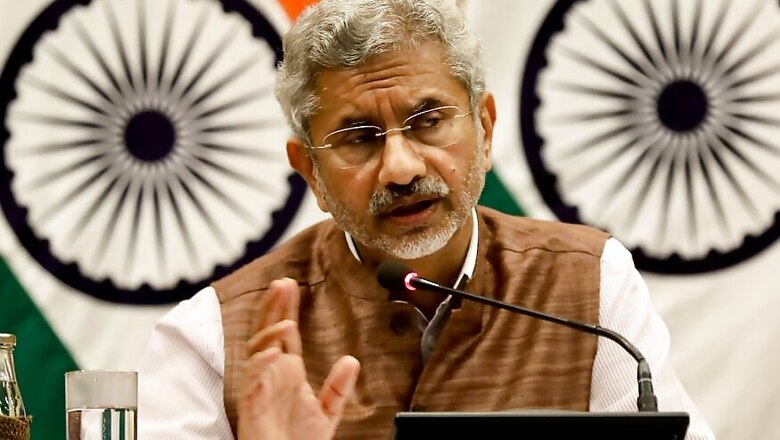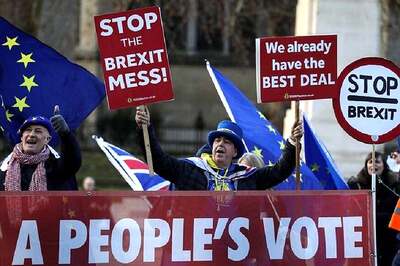
views
New Delhi: Amid spiralling US-Iran tensions over the killing of Iranian military commander Qasem Soleimani, External Affairs Minister S Jaishankar on Sunday had a conversation with his Iranian counterpart Javad Zarif and US Secretary of State Mike Pompeo and highlighted India's stakes and concerns.
Jaishankar also separately spoke about the tense situation with Omani Foreign Minister Yusuf Alawi and his UAE counterpart Sheikh Abdullah bin Zayed Al Nahyan.
"Had a telephonic discussion with Secretary of State @SecPompeo on the evolving situation in the Gulf region. Highlighted India's stakes and concerns," Jaishankar wrote on Twitter.
Had a telephonic discussion with Secretary of State @SecPompeo on the evolving situation in the Gulf region. Highlighted India's stakes and concerns.— Dr. S. Jaishankar (@DrSJaishankar) January 5, 2020
Pompeo also put out a tweet stating that he spoke to Jaishankar regarding Iran’s continued threats and provocations, adding the Donald Trump administration won’t hesitate to act to keep American lives, and those of our friends and allies, safe.
.@DrSJaishankar and I spoke just now regarding Iran’s continued threats and provocations. The Trump Administration won’t hesitate to act to keep American lives, and those of our friends and allies, safe.— Secretary Pompeo (@SecPompeo) January 5, 2020
Regarding his conversation with Zarif, Jaishankar said India was deeply concerned about the levels of tensions and the duo would remain in touch. "Just concluded a conversation with FM @JZarif of Iran. Noted that developments have taken a very serious turn. India remains deeply concerned about the levels of tension. We agreed to remain in touch," the External Affairs Minister tweeted.
Just concluded a conversation with FM @JZarif of Iran. Noted that developments have taken a very serious turn. India remains deeply concerned about the levels of tension. We agreed to remain in touch.— Dr. S. Jaishankar (@DrSJaishankar) January 5, 2020
Major General Soleimani (62), the head of Iran's elite al-Quds force and architect of its regional security apparatus, was killed when a US drone fired missiles into a convoy that was leaving the Baghdad International Airport early on Friday. The strike also killed the deputy chief of Iraq's powerful Hashed al-Shaabi paramilitary force.
Soleimani's killing was the most dramatic escalation yet in spiralling tensions between Iran and the US.
Reacting to the killing of a top Iranian commander by the US, India had on Friday said the increase in tension had alarmed the world and asserted that peace, stability and security in the region is of utmost importance to it.
In a statement, the External Affairs Ministry had said India consistently advocated restraint and continued to do so and it was vital that the situation did not escalate further.
Tension in the Gulf doesn't bode well for India as the country's economy is in a precarious position with Gross Domestic Product growth plummeting and the government struggling to make ends meet, without massively overshooting the fiscal deficit target.
An external shock — in the form of high oil prices or a drop in remittances from the Indians who live in West Asia — could make things much worse.
Impact on India
There are two primary dangers for India, other than the extremely destabilising effects of any outright war in the region.
One, there are 8 million Indians living and working in West Asia, the vast majority of whom live in the Arabian Gulf. Conflict would put them all in danger, as it did at the start of the 1990s, when the US went to war with Iraq and New Delhi had to arrange an airlift of more than 110,000 Indian citizens.
Kerala has already begun coming to terms with the idea that many more will return. A sudden jolt would put pressure on the places Indians return to, and also endanger the $40 billion in remittances India receives from West Asia – more than 50% of all remittances to the country, a key source of foreign exchange.
Then there is the question of oil prices. Though international prices have gone up by 4% since the strike on Soleimani, analysts do not currently expect them to get much higher – presuming it is in no one's interests for that to happen and that both the US and Iran will back down from outright conflict.
Yet if that presumption is wrong, India will face some difficult times. Although India does not now import much oil from Iran, it is still heavily reliant on the the Strait of Hormuz – the tiny span of water through which a quarter of the world’s oil and a third of its natural gas travels. Higher oil prices would automatically mean inflation in India, where analysts are already worried about rising food prices.
Even if India's economy were on a more stable footing, conflict in the region would be dangerous. But the current tensions, coming as they do when the Indian economy seems poised on a precipice, should be even more alarming for policymakers.
(With PTI inputs)




















Comments
0 comment